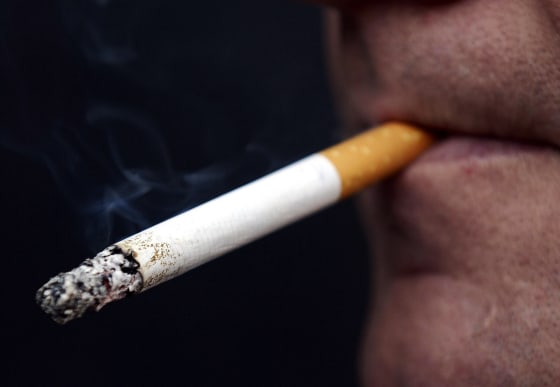Even extremely light smoking — as little as one cigarette a day — can greatly increase someone’s risk of dying early, government researchers reported Monday.
It’s worrying because more and more people are reporting they smoke just one to 10 cigarettes a day in the hope that it will be less dangerous to their health, the team at the National Cancer Institute found.

“The results of this study support health warnings that there is no safe level of exposure to tobacco smoke,” said Maki Inoue-Choi, who led the study team.
“Together, these findings indicate that smoking even a small number of cigarettes per day has substantial negative health effects and provide further evidence that smoking cessation benefits all smokers, regardless of how few cigarettes they smoke.”
Even people who said they smoked an average of less than one cigarette a day had a 64 percent higher risk of dying early than nonsmokers, the researchers found.
“The results of this study support health warnings that there is no safe level of exposure to tobacco smoke."
People who smoked up to half a pack a day, when averaged over a lifetime, had an 87 percent higher risk of dying early than people who had never smoked, the team reported in the journal of the American Medical Association’s JAMA Internal Medicine.
The team looked at surveys of nearly 300,000 people who detailed smoking habits for every decade of life as part of a joint National Institutes of Health–AARP program. On average, they were 71 when the researchers looked at their surveys.
Related: Smoking Kills More Southerners
“Low-intensity smoking over the lifetime was associated with a significantly higher risk of all-cause mortality, including deaths from lung cancer and cardiovascular disease,” the team wrote.
The sooner they quit, the lower the risks, the team found.
Smoking is the biggest cause of preventable illness, killing more than 480,000 Americans every year, according to the Centers for Disease Control and Prevention.
Globally, tobacco kills about 6 million people a year from cancer, heart disease, lung disease and other illnesses.
“Smokers would have been less likely to have lived long enough to enter our study than never-smokers."
Smoking rates have plummeted in the U.S. and now only about 15 percent of U.S. adults smoke — and just 11 percent of high school students smoke.
But, Inoue-Choi’s team found, the percentage of regular tobacco users who say they smoke fewer than 10 cigarettes per day has grown from 16 percent in 2005 to 27 percent in 2014. And about 23 percent of smokers say they don’t smoke every day.
“Low-intensity smoking was traditionally considered a transient smoking reduction practice among individuals who were trying to quit,” the researchers wrote.
Related: Smoking Permanently Scars Your DNA, Study Finds
“However, studies indicate that many low-intensity smokers maintain these smoking patterns for many years over their lifetime. Such a smoking pattern has historically been more common among racial and ethnic minorities who nevertheless have high rates of smoking-related morbidity and mortality.”
The researchers said their study mostly included whites, so it may not reflect the bigger risks among African-Americans. Plus, they said, it may underestimate the true risk.
“Smokers would have been less likely to have lived long enough to enter our study than never-smokers, such that our relative risks for smoking may be underestimated,” they wrote.

